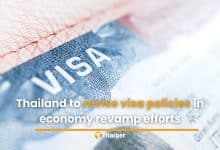Thai pilots oppose foreign pilots on domestic routes amid tourism surge

The Thai Pilots Association has taken a definitive stance against the recent Cabinet decision allowing foreign pilots to operate domestic routes through wet lease agreements. Yesterday, December 6, they formally petitioned the Labour and Transport ministries to reconsider the move, which was introduced to address a perceived shortage of commercial pilots amid a surge in tourism activity.
The Cabinet’s decision, made last week, permits foreign pilots to serve on domestic routes for six months. The government believes this measure is essential to cope with the increased demand for air travel.
However, Teerawat Angkasakulkiat, President of the Thai Pilots Association, challenges this rationale, citing that the law allowing foreigners to work as pilots in Thailand insists that there is a shortage of qualified Thai pilots.
Reports from the Civil Aviation Authority of Thailand indicate there are currently 3,024 commercial pilots in the country. During the pandemic, approximately 1,026 pilots were dismissed, and there are 1,219 graduates from pilot schools holding commercial pilot licenses still waiting for employment opportunities. Teerawat suggested that the move contradicts a two-decade national labour strategy.

“The Cabinet’s approval contradicts the 20-year national strategy for the labour sector, particularly the section from 2023 to 2027 focusing on future industries and services.”
He further argued that allowing foreign pilots to operate aircraft such as the Airbus A320, for which Thai pilots are well-trained, would detrimentally affect local employment prospects. This situation, according to Teerawat, could deter younger individuals from pursuing careers as pilots due to perceived instability.
Teerawat suggested that if airlines persist in using temporary wet lease agreements annually, it will undoubtedly impact the domestic pilot job market and erode Thailand’s competitiveness in aviation.
Teerawat also expressed concerns about the potential ripple effects on related sectors, such as the use of foreign drone operators in agriculture.
In aviation terms, a wet lease is where an airline leases an aircraft, complete with crew, maintenance, and insurance, from another airline.
The association is pressing the Transport Ministry to restrict Thai airlines from entering wet lease agreements unless regulations are updated to align with international standards.
Local airlines are advocating for wet leases under Section 33/1 of the Thailand Air Navigation Act, yet certain aspects of this legislation fall short of the International Civil Aviation Organization’s (ICAO) Universal Safety Oversight Audit Program criteria.
This discrepancy raises significant concerns about adhering to international safety standards, posing a risk of Thailand receiving another ICAO red flag, as it did in 2015, confirmed Teerawat.
Thailand is not a signatory to Article 83bis of the Chicago Convention, which permits the state of registry to delegate supervisory duties of an aircraft to the state of the operator.
The ICAO is scheduled to conduct an audit of Thailand’s aviation operations in the third quarter of next year, reported Bangkok Post.
Frequently Asked Questions
Here are some common questions asked about this news.
Why is the Thai Pilots Association opposing foreign pilots on domestic routes?
They argue it undermines local employment and contradicts national labour strategies, claiming no shortage of qualified Thai pilots.
How might relying on foreign pilots impact Thailand’s aviation competitiveness?
It could erode local job stability and discourage future generations from pursuing pilot careers, weakening the domestic aviation sector.
What are the potential consequences of Thailand not aligning with international aviation standards?
Thailand risks receiving another ICAO red flag, which could affect its global aviation reputation and operational safety perceptions.
What if Thailand continues to use wet lease agreements frequently?
It may destabilise the domestic pilot job market and negatively influence the country’s aviation industry competitiveness.
How does the wet lease practice challenge existing Thai aviation laws?
It contravenes national regulations prohibiting foreign pilots, creating legal and safety oversight discrepancies with international aviation standards.
Latest Thailand News
Follow The Thaiger on Google News:


























